Are you interested in saving money and decreasing your environmental footprint? Ground source heat pumps could be the solution you’re looking for. Learn more about the effectiveness, installation process, and cost of these systems.
With a lifespan of approximately 25 years and the potential to save up to £1,600 a year on heating bills, ground source heat pumps offer a reliable and sustainable heating solution. Join us as we uncover the money-saving potential of these innovative systems.
Key Takeaways
- Ground source heat pumps can save up to £1,600 a year on heating bills when replacing an old electric system.
- Ground source heat pumps have a long product lifespan, with components lasting approximately 25 years and ground loop systems lasting up to 80 years.
- Ground source heat pumps provide equal distribution of heat throughout the home.
- Ground source heat pumps offer constant performance throughout the year.
Ground Source Heat Pump Basics
Let’s explore the basics of ground source heat pumps and how they can save you money.
Ground source heat pumps have numerous benefits, including significant savings on your heating bills. By replacing an old electric system, you can save up to £1,600 per year. These heat pumps have a long product lifespan, with components lasting approximately 25 years and ground loop systems lasting up to 80 years.

One of the advantages of ground source heat pumps is their ability to provide equal distribution of heat throughout your home, ensuring your comfort in every room. Additionally, they offer constant performance throughout the year, regardless of the outside temperature.
When it comes to installation costs, ground source heat pump prices can vary depending on the project and household specifications. It’s important to consider the type of loop system and the size of your property when estimating the installation costs.
Ground Source Heat Pump Lifespan and Performance
Moving on to the lifespan and performance of ground source heat pumps, we can see that these systems are built to last and provide reliable heating and cooling for many years. Here are some key points to consider:
Ground source heat pump maintenance:

Regular maintenance is essential to ensure optimal performance and longevity of the system.
Simple tasks like cleaning or replacing filters can be done by homeowners, reducing maintenance costs.
Ground source heat pump energy savings:
Ground source heat pumps are highly energy-efficient, with a coefficient of performance (COP) ranging from 3.5 to 4.5.

This means that for every unit of electricity consumed, 3.5 to 4.5 units of heat are generated, resulting in significant energy savings and lower utility bills.
Investing in a ground source heat pump not only provides long-term reliability but also offers substantial energy savings. With proper maintenance, these systems can provide efficient heating and cooling for years to come, giving homeowners the freedom to enjoy comfortable indoor temperatures while reducing their carbon footprint.
Types of Ground Source Heat Pumps
Now, let’s delve into the different types of ground source heat pumps available for heating and cooling homes.
When it comes to ground source heat pumps, there are two main types: vertical and horizontal.

Vertical heat pumps use boreholes for heat extraction, making them suitable for restricted spaces. These systems are commonly used in suburban homes and require insulation to enhance their efficiency.
On the other hand, horizontal heat pump systems are laid in trenches and are more common in rural areas with available land. The area required for horizontal systems depends on various factors, but on average, a 150 m2 home needs an area of 300-700 m2 for installation.
Both types of systems can be either closed loop or open loop. Closed loop systems, whether vertical or horizontal, use a continuous loop of piping to draw heat from the ground, while open loop systems extract groundwater for heat extraction.
Closed Loop Ground Source Heat Pump Systems
Exploring closed loop ground source heat pump systems, we can understand how they utilize a continuous loop of piping to draw heat from the ground. This type of system offers several advantages over open loop systems, including lower maintenance requirements and increased durability.
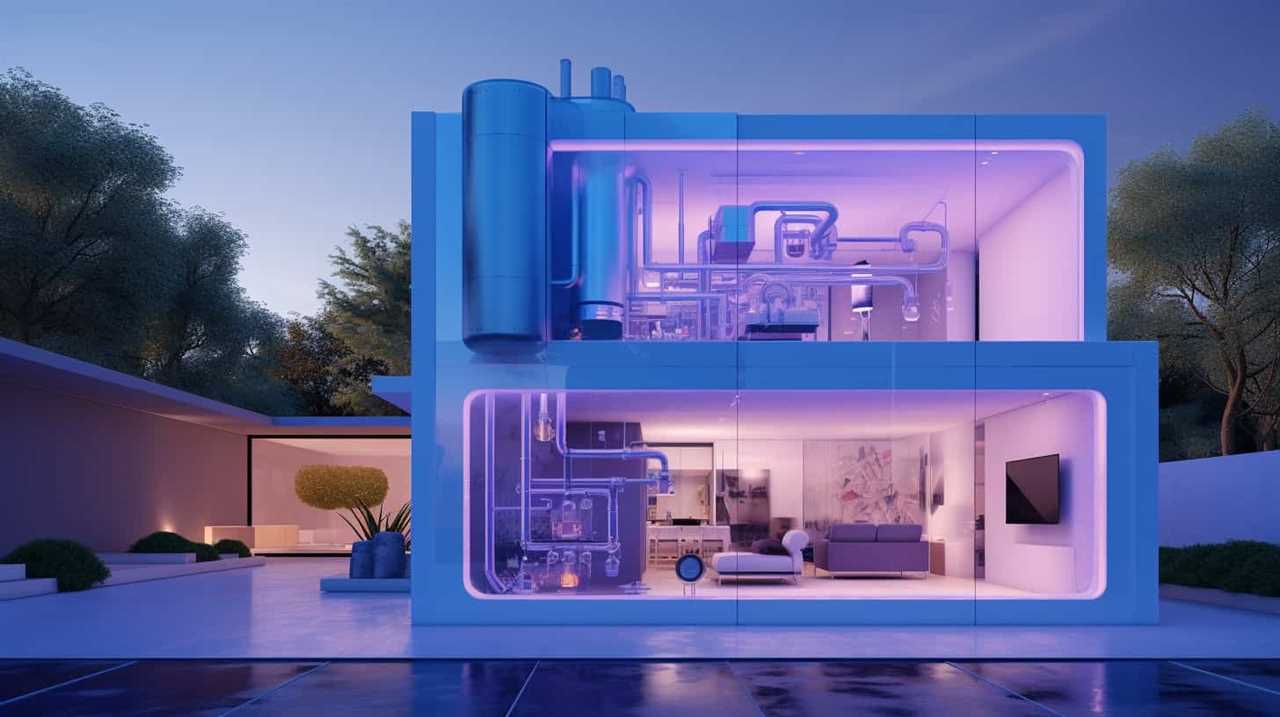
Here are two reasons why closed loop ground source heat pump systems are a cost-effective choice:
Closed loop ground source heat pump costs:
Closed loop systems tend to have lower installation costs compared to open loop systems due to the absence of water extraction and treatment equipment.
The closed loop design also reduces the risk of system failure and the associated repair costs, providing long-term savings.

Closed loop vs. open loop ground source heat pumps:
Closed loop systems are more versatile and can be installed in a variety of locations, making them a viable option for homeowners who desire flexibility and freedom.
Unlike open loop systems that rely on groundwater availability, closed loop systems can operate effectively even in areas with limited access to water sources.
Ground Source Heat Pump Efficiency
Ground Source Heat Pump Efficiency is a key factor in determining the energy-saving potential of these systems. Ground source heat pumps have an efficiency of 300% to 400%, meaning that for every kilowatt of electricity consumed, around 3-4 kilowatts of heat is generated. This is due to the fact that GSHPs utilize the constant temperature of the ground, resulting in significant energy savings.
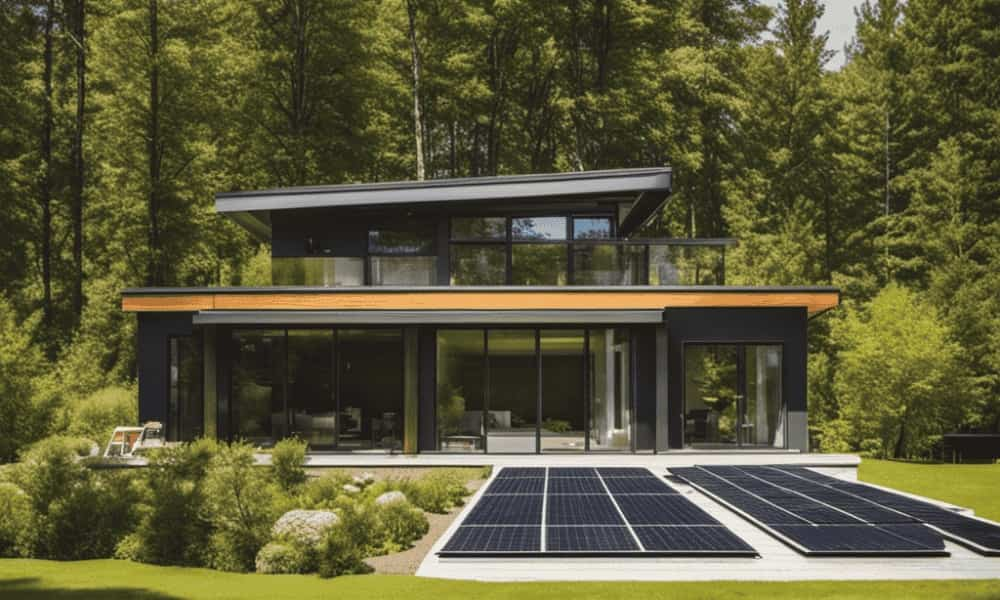
The type of soil can also affect GSHP efficiency. Interestingly, cold weather doesn’t significantly impact GSHP efficiency, as the temperature of the ground remains stable throughout the year.
It’s worth noting that the efficiency of GSHPs can be measured using two parameters: COP and SCOP. COP represents the performance delivered at a specific moment, while SCOP provides an average efficiency for the whole year.
In terms of maintenance, regular ground source heat pump maintenance is necessary to ensure optimal efficiency. Additionally, conducting a thorough ground source heat pump cost analysis is important to determine the overall financial benefits of these systems.
Cold Weather Efficiency
During cold weather, the efficiency of ground source heat pumps remains largely unaffected, as the temperature of the ground remains stable throughout the year. This means that even in freezing temperatures, ground source heat pumps can still provide reliable and efficient heating for your home.
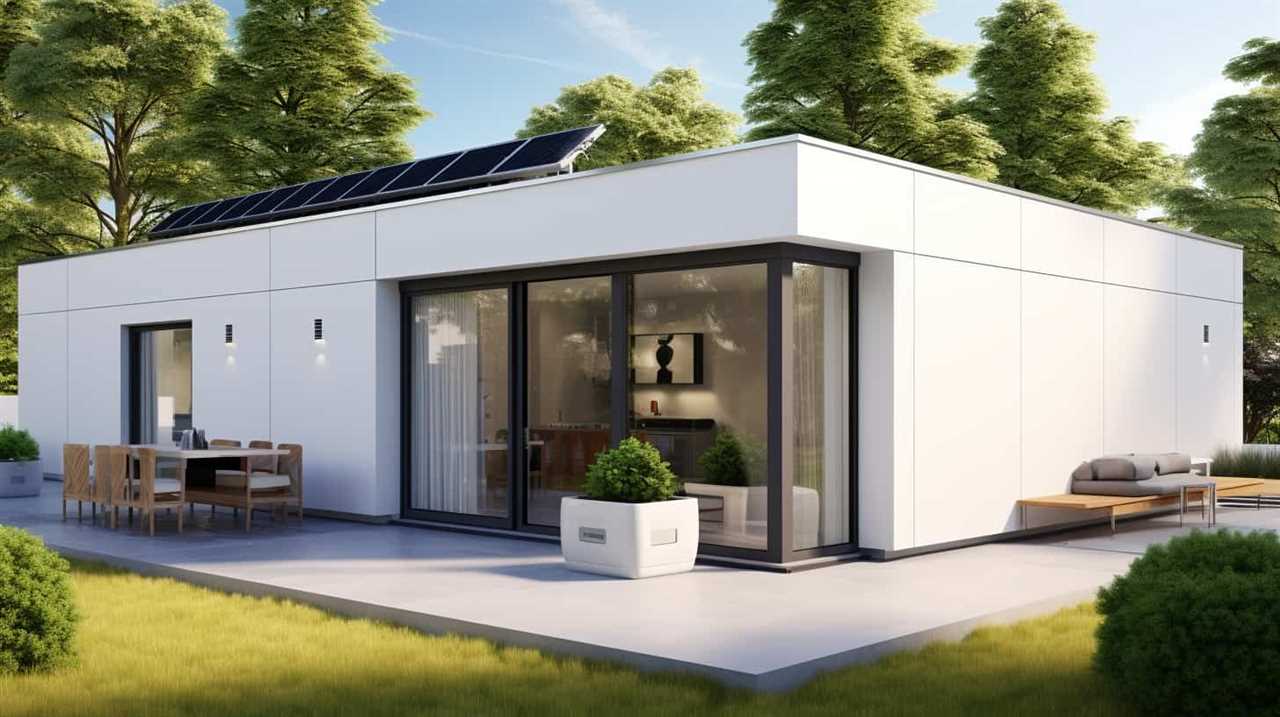
Here are two reasons why cold weather has minimal impact on the efficiency of ground source heat pumps:
Ground source heat pumps utilize the stable temperatures of the earth, which remain constant throughout the year. This allows them to efficiently extract heat from the ground and transfer it to your home, regardless of the outside temperature.
Vertical ground source heat pumps are less affected by cold weather because their external pipelines are inserted deep into the soil, where the temperature is more stable. This ensures that the heat pump can maintain its efficiency even in the coldest of winters.
With the cold weather impact being minimal, ground source heat pump maintenance becomes less of a concern. This means that you can enjoy the freedom of having a reliable and energy-efficient heating system without worrying about frequent maintenance or repairs.

COP and SCOP of Ground Source Heat Pumps
Let’s dive into the efficiency of ground source heat pumps by exploring their COP and SCOP.
Ground source heat pumps have a coefficient of performance (COP) ranging from 3.5 to 4.5, meaning that for every kilowatt of electricity consumed, they generate around 3 to 4 kilowatts of heat. This high COP indicates that ground source heat pumps are highly efficient in converting energy into heat.
However, it’s important to note that COP represents the performance delivered at a specific moment, while the seasonal coefficient of performance (SCOP) provides an average efficiency for the entire year. SCOP takes into account the efficiency of the system during different times of the year, considering variations in temperature and heating demands.
Regular maintenance is crucial for ensuring that ground source heat pumps maintain their high efficiency levels. Additionally, ground source heat pumps offer significant environmental benefits, such as reducing carbon emissions and dependence on fossil fuels. By harnessing the constant temperature of the ground, these heat pumps contribute to a greener and more sustainable future.

Installation of Ground Source Heat Pumps
Now, let’s explore the process of installing ground source heat pumps to harness their money-saving power.
Ground source heat pump installation cost:
The cost of installing a ground source heat pump can range from £16,000 to £35,000, depending on factors such as the type and size of the system, installation complexity, and labor cost.
Financing options are available to make the installation more affordable and accessible.

Ground source heat pump installation process:
The installation process for ground source heat pumps involves two main types: vertical and horizontal.
Vertical installation requires drilling a well and installing a heat exchanger. It requires fewer surface areas and is suitable for restricted spaces.
Horizontal installation involves digging up a large area of land and laying the heat exchange pipes in trenches. It’s more common in rural areas with available land.
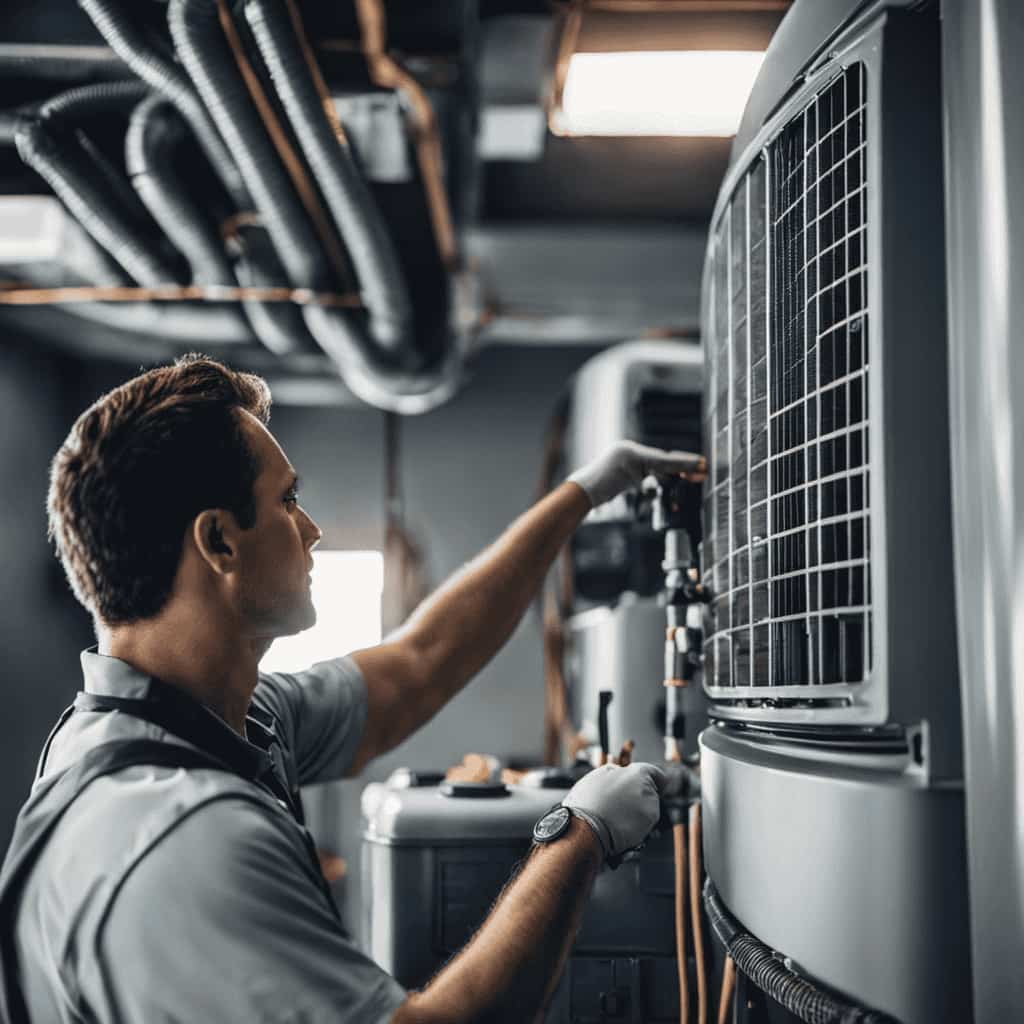
Benefits, Money-saving Potential, and Brands
To further explore the money-saving potential of ground source heat pumps, let’s delve into the benefits, cost-effectiveness, and reputable brands available in the market.
Ground source heat pumps offer numerous benefits, including significant savings on heating bills, equal distribution of heat throughout the home, and constant performance throughout the year. By replacing an old electric system, homeowners can save up to £1,600 annually.
When it comes to cost-effectiveness, ground source heat pump prices vary depending on the project and household specifications. However, the long lifespan of components (approximately 25 years) and ground loop systems (up to 80 years) make them a worthwhile investment.
As for brands, popular options include Vaillant, Worcester Bosch, and NIBE. These brands are known for their reliability, efficiency, and advanced features.
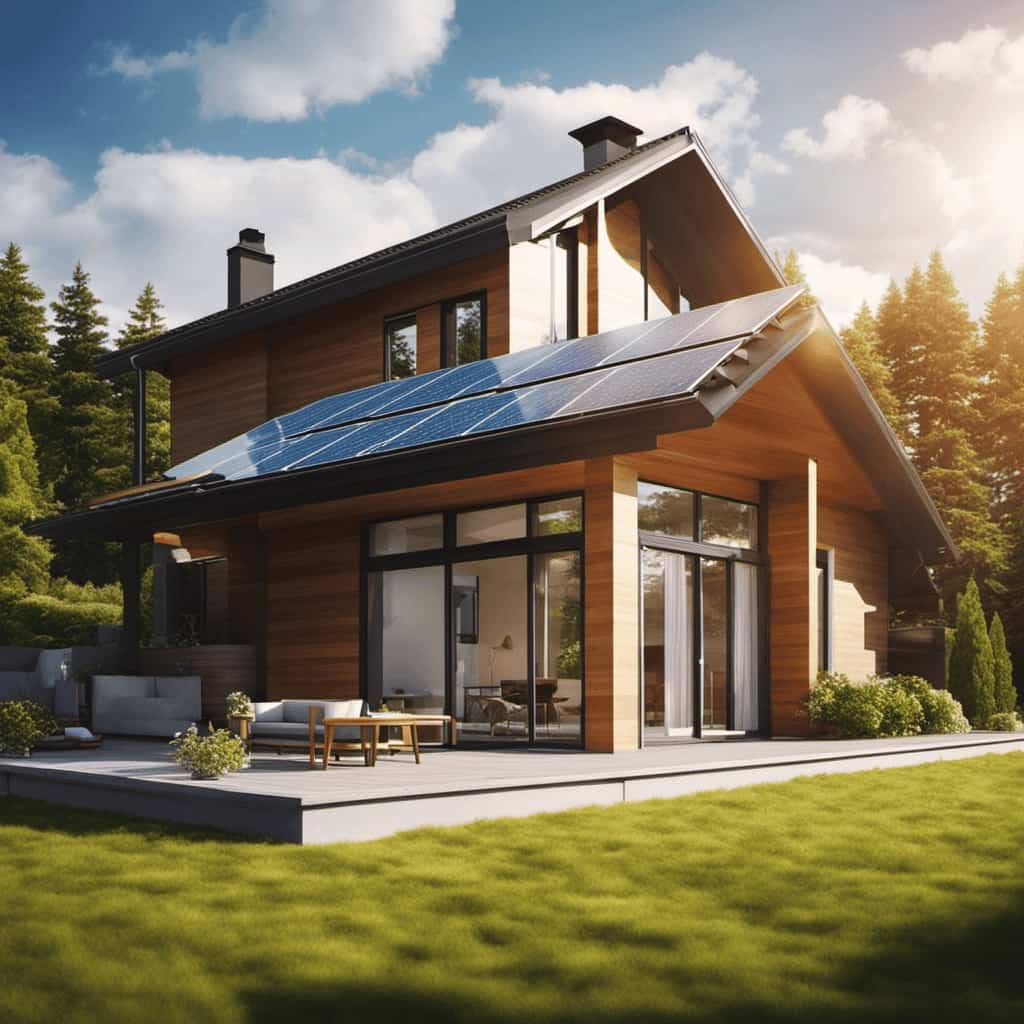
Frequently Asked Questions
What Is the Average Payback Period for a Ground Source Heat Pump?
The average payback period for a ground source heat pump depends on factors such as installation cost and savings on energy bills. However, with proper maintenance, it can typically range from 8 to 15 years.
Are Ground Source Heat Pumps Eligible for Government Incentives or Grants?
Ground source heat pumps, eligible for government incentives and grants, offer significant energy savings and reduce environmental impact. With their money-saving power, they provide a cost-effective and sustainable solution for heating and cooling homes.
How Does the Installation of a Ground Source Heat Pump Affect Property Value?
The installation of a ground source heat pump can positively affect property value by increasing energy efficiency. It is a smart investment that saves money on heating bills and appeals to environmentally conscious buyers.
Can a Ground Source Heat Pump Be Used for Cooling as Well as Heating?
Yes, a ground source heat pump can be used for cooling as well as heating. It offers efficient cooling by extracting heat from the indoor air and transferring it to the ground, providing year-round comfort and energy savings.

Are There Any Maintenance Requirements for a Ground Source Heat Pump?
Regular maintenance is essential for ground source heat pumps to ensure optimal performance and longevity. By conducting routine inspections, cleaning, and servicing, you can maximize energy efficiency, prevent costly repairs, and extend the lifespan of your system.
How Does Heat Pump Technology Contribute to Sustainability?
Heat pump technology and sustainability go hand in hand. By harnessing natural energy sources such as air, water, or ground, heat pump systems efficiently transfer heat, reducing reliance on fossil fuels. This technology significantly lowers greenhouse gas emissions, making it an eco-friendly option for both heating and cooling needs. By promoting energy efficiency and careful resource management, heat pump technology contributes to a more sustainable future.
Conclusion
In conclusion, ground source heat pumps offer an incredible money-saving potential for homeowners. With the ability to save up to £1,600 a year on heating bills, these systems provide a cost-effective and environmentally friendly heating solution.
Not only do they have a long lifespan of approximately 25 years, but they also offer constant performance and equal heat distribution throughout your home. By harnessing the stable temperatures of the earth, ground source heat pumps can revolutionize your heating system and provide comfort while saving you money.









